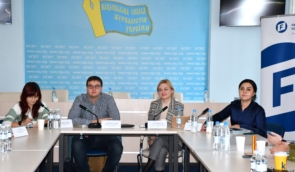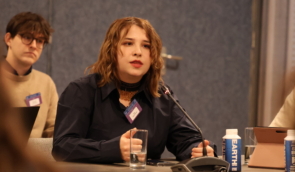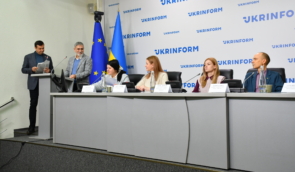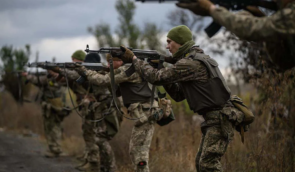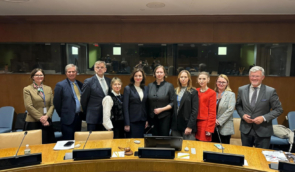Moscow planned the forced deportation of Ukrainians to Russia even before its full-scale invasion
Russia’s ‘legalization’ of forced deportation of Ukrainians from occupied territory on 18 May is only the latest step in policy that was clearly planned from the beginning, a report has demonstrated.

During commemorative events on 18 May marking the 79th anniversary of the Soviet Deportation of the Crimean Tatar people from their homeland, Onysia Syniuk, legal analyst for ZMINA Human Rights Centre, pointed out that Moscow is now repeating this crime which should, like the 1944 Deportation, be properly classified as genocide, with those responsible being held to answer. Russia, meanwhile, marked this most sombre of anniversaries in typically cynical fashion by adopting the final version of legislation allowing for the forced deportation of Ukrainians from territory currently under Russian occupation.
Ukrainian human rights groups have long warned that Russia’s forced deportation of children to the Russian Federation bore all the hallmarks of genocide. It was, therefore, fitting that the first arrest warrants issued by the International Criminal Court at the Hague were against Russian president Vladimir Putin and his so-called ‘commissioner of children’s rights’ Maria Lvova-Belova over alleged war crimes linked with such deportation. On 27 April, the Parliamentary Assembly of the Council of Europe [PACE] passed a resolution recognizing the kidnapping and deportation of Ukrainian children to Russia as genocide.
The ZMINA report published on 18 May provides an account of Russia’s movement of Ukrainian citizens since shortly before its full-scale invasion until early in March 2023, and analyses this from the point of view of international law.
Just as back in 1944, Moscow’s forced deportation of Ukrainians in 2022 was planned, and, in fact, began from occupied Donbas a few days before the full-scale invasion. As Syniuk explained in her presentation, the ‘wrapping’ this time is rather different, with Russia now trying to call this ‘evacuation’ and claiming that it is ‘rescuing’ Ukrainians.
In fact, international law could not be clearer. Article 49 of the Fourth Geneva Convention states unequivocally that “individual or mass forcible transfers, as well as deportations of protected persons from occupied territory to the territory of the Occupying Power or to that of any other country, occupied or not, are prohibited, regardless of their motive.”
The article does go on to allow for total or partial evacuation, but only “if the security of the population or imperative military reasons so demand. Such evacuations may not involve the displacement of protected persons outside the bounds of the occupied territory except when for material reasons it is impossible to avoid such displacement. Persons thus evacuated shall be transferred back to their homes as soon as hostilities in the area in question have ceased.”
It is Russia that has placed Ukrainians’ safety and their very lives in jeopardy, and this can hardly be used as an excuse for moving them to Russia. The only “material reason” for making it impossible to evacuate people to government-controlled Ukraine lay in Russia’s refusal to provide safe access, and repeated shelling and killing of those trying to flee.
International law is also categorical that any such movement should be temporary. This has very clearly not been the case with children who have been placed in ‘re-education camps’ and handed over for ‘adoption’ in Russia. It is also not applicable, as the report finds, with respect to adults. ZMINA cites conversations with victims of deportation who confirm that, for example, they were obstructed when they tried to leave the Russian Federation for EU countries (from where they could return home to Ukraine). One woman told ZMINA that the Russian authorities had come up with several different pretexts for refusing to sell her tickets to an EU country.
Those taken to Russia were immediately forced to travel further into the RF, separated from the people they had come with and often put on trains without even being told where they were headed. All of this was clearly aimed at making their return that much more difficult.
Some of the Ukrainians whom ZMINA spoke with were simply tricked. In trying to force people to leave Mariupol for Russia, the Russians claimed in some cases that the buses were headed for Zaporizhzhia, under Ukrainian control. They were instead taken to Nikolske in occupied Donetsk oblast for so-called ‘filtration’
Such ‘filtration’ (interrogations, checks of people’s phones, even tattoos) mainly to identify those deemed ‘too’ pro-Ukrainian is, in itself, a crime and in clear breach of international law.
There were never any legitimate grounds for moving Ukrainians to the Russian Federation, yet this was clearly planned in advance with the first moves at such so-called ‘evacuation’ announced on around 18 February 2022. The study points to Russian parliamentary decisions from as early as March 2022 regarding distribution of Ukrainians around Russia Measures aimed at significantly simplifying procedure for making Ukrainians ‘Russian citizens’ had begun as early as April 2019 and it is doubtless no coincidence that Putin back in January 2022 tabled a draft law envisaging “change in the state border of the Russian Federation” as grounds for obtaining Russian citizenship.
The key point about deportation is that this is not voluntary. Syniuk stresses that coercion does not have to be of a physical nature. In situations where Russia had created an information vacuum, it could easily use terror and threats to make people believe that their lives were in immediate danger unless they got into buses to Russia. Yevhen Mezhevyi, a solo father of three from Mariupol, was told by Russian soldiers in late April 2022 that the family must leave the basement where they were sheltering from Russian bombs and get on ‘evacuation buses’, since Chechen spetsnaz would soon arrive and carry out a purge. Mezhevyi himself was seized and imprisoned for so-called ‘filtration’, and he was only able at the last minute to get to Moscow and prevent his children from being forcibly ‘adopted’ (details here). ZMINA spoke with people from Kharkiv oblast who had been lied to and assured that any ‘evacuation’ was only for three days. The Russians had run from house to house, terrifying people with lurid and completely false claims about the Ukrainian Armed Forces arriving and destroying their village. Having hounded people out in such manner, the Russians then tried to use this for propaganda videos about supposed ‘evacuation’.
Russia blocked real evacuation to government-controlled Ukraine, while, at the same time, destroying infrastructure and placing people’s lives, and the lives of their children, in danger. Even those who got onto buses, headed for Russia, without open coercion can hardly be said, under such circumstances, to have been given free choice.
Source: Human Rights in Ukraine – the information portal of the Kharkiv Human Rights Protection Group
If you have found a spelling error, please, notify us by selecting that text and pressing Ctrl+Enter.

